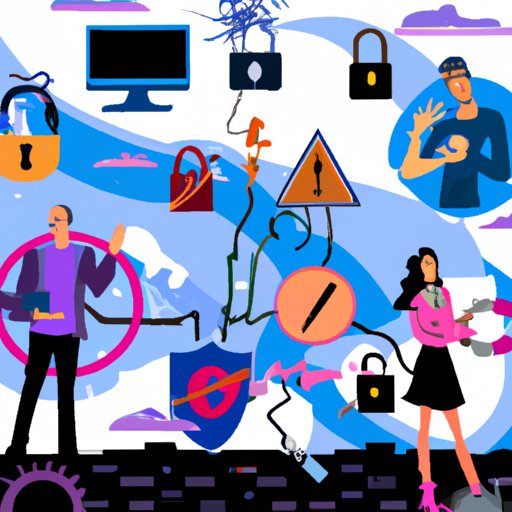Introduction
Technology has become an integral part of our daily lives. From smartphones to computers, we rely on technology for everything from communication to entertainment. While technology can be incredibly helpful, it also has its drawbacks. This article will explore the negative effects of technology on our lives, including cybercrime, diminished social skills, increased stress levels, loss of privacy, physical health issues, environmental damage, and job displacement.
Increased Risk of Cybercrime
Cybercrime is a growing problem in today’s digital world. According to the Federal Bureau of Investigation (FBI), “cybercrime is any criminal activity that involves a computer, network, or device.” Examples of cybercrime include identity theft, phishing scams, malware attacks, and data breaches.
Cybercriminals use a variety of strategies to carry out their attacks. These include phishing emails, malicious software, and social engineering tactics. For example, they may send an email that appears to be from a legitimate source, such as a bank, in order to gain access to sensitive information. They may also install malicious software on a victim’s computer in order to steal personal data.
The best way to protect yourself from cybercrime is to be aware of the potential risks and take steps to protect yourself. Make sure your computer is up-to-date with the latest security patches and use strong passwords for all online accounts. Additionally, never click on links or download attachments from unknown sources.
Diminished Social Skills
Technology has drastically changed the way we interact with each other. Social media platforms like Facebook, Twitter, and Instagram have become a primary means of communication. While these platforms can be incredibly useful, they can also have a negative impact on our social skills.
One of the key ways social media affects our social skills is by replacing face-to-face interactions. Studies have shown that spending too much time on social media can lead to feelings of loneliness and depression. Additionally, constant exposure to digitally edited images and videos can lead to unrealistic expectations and feelings of inadequacy.
To counteract these negative effects, it’s important to limit your time on social media and make an effort to engage in face-to-face interactions. Additionally, be mindful of what you’re posting online and try to focus on positive messages rather than negative ones.
Increased Stress Levels
Technology can also have a negative effect on our stress levels. Constant notifications, emails, and text messages can make us feel overwhelmed and anxious. Additionally, the pressure to stay connected 24/7 can lead to feelings of burnout and exhaustion.
Signs of stress include difficulty sleeping, irritability, and fatigue. If left unchecked, stress can lead to serious health problems such as anxiety, depression, and heart disease.
In order to reduce stress, it’s important to unplug from technology every now and then. Take regular breaks from your devices and set boundaries for yourself. Additionally, practice deep breathing and mindfulness exercises to help you relax.
Loss of Privacy
The rise of technology has also led to a loss of privacy. Companies are collecting more data than ever before and using it for a variety of purposes, from targeted ads to political campaigns. Additionally, data breaches are becoming increasingly common, leaving users vulnerable to identity theft and other forms of fraud.
The best way to protect yourself from data breaches is to take steps to increase your online privacy. Be sure to use strong passwords for all of your accounts and avoid clicking on suspicious links or downloading attachments from unknown sources. Additionally, consider using a Virtual Private Network (VPN) to secure your connection when accessing public Wi-Fi networks.
Physical Health Issues
Excessive use of technology can also have a negative impact on our physical health. Spending too much time sitting in front of a screen can lead to neck and back pain, eye strain, and headaches. Additionally, blue light emitted from devices can disrupt our sleep patterns and lead to insomnia.
To promote better physical health, it’s important to take regular breaks from your devices. Make sure to get up and move around throughout the day and limit your screen time in the evening. Additionally, invest in a pair of blue light blocking glasses to reduce eyestrain.
Environmental Damage
Technology also has a negative impact on the environment. The production of electronic devices requires a lot of energy, which leads to increased carbon dioxide emissions. Additionally, the materials used to produce these devices, such as metals and plastics, can be difficult to recycle and often end up in landfills.
One way to reduce the environmental impact of technology is to purchase products that are made from recycled materials. Additionally, look for energy-efficient devices and opt for sustainable packaging when possible. Finally, donate or recycle old electronics rather than throwing them away.
Job Displacement
Finally, technology has had a significant impact on the job market. Automation and artificial intelligence are quickly displacing human workers in many industries, leading to rising unemployment rates. Additionally, workers in fields such as manufacturing and transportation are at risk of being replaced by robots.
In order to address this issue, governments and businesses need to work together to create new jobs that can’t be automated. Additionally, workers should focus on developing skills that can’t be replaced by machines, such as creativity and problem-solving.
Conclusion
While technology can be incredibly helpful, it also has its drawbacks. This article explored the various negative effects of technology on our lives, including cybercrime, diminished social skills, increased stress levels, loss of privacy, physical health issues, environmental damage, and job displacement. It’s important to be aware of these risks and take steps to protect yourself. Additionally, limiting your time on technology and engaging in face-to-face interactions can help to offset some of the negative effects.
(Note: Is this article not meeting your expectations? Do you have knowledge or insights to share? Unlock new opportunities and expand your reach by joining our authors team. Click Registration to join us and share your expertise with our readers.)
